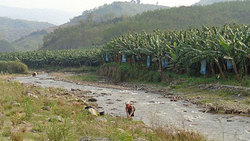Radio Free Asia | 5 March 2019
Chinese Banana Plantations in Lao District Leave Locals With Little Land to Farm
Concessions of land made by the government of Laos to Chinese banana farms are leaving villagers in one northern district without enough land of their own to feed their families, sources in the communist Southeast Asian country say.
In the Beng district of Oudomxay province in northern Laos, Lao villagers once had sufficient land for farming, an official in the province’s Department of Agriculture and Forestry told RFA’s Lao Service, speaking on condition of anonymity.
“But the land available for farming has shrunk every year, and local farmers now have limited land on which to grow rice,” RFA’s source said.
“In Beng, the government has set a target for this year of 12,760 hectares for the cultivation of rice, and state authorities have fixed irrigation systems for three big projects and in five different areas. And though local farmers normally need at 12,156 hectares to feed their families, only 3,593 hectares are really available.”
“Most of the [district’s] land is still held by concessions,” he said.
Concerns over chemical run-off from the heavily polluting Chinese plantations led in January 2017 to government orders forbidding new Chinese farms from being formed in the country’s northern provinces, but many still operate under contracts valid for several more years.
“Many have contracts that will expire in 2020 or 2021,” the source said. “And some may be allowed to operate even longer if they promise to grow something other than bananas.”
“The local farmers will have to wait,” he said.
Continuing pollution fears
As Chinese plantations encroached on district land over the years, some villagers sought work on the farms but left after being sickened by pesticides, while others left to find work in other provinces but returned to grow vegetables on plots of land too small to grow rice, sources said in earlier reports.
Now, some villagers fear that after the banana farms are closed, Chinese farms working under orders to grow different crops will simply continue to pollute, sources told RFA.
Chemical run-off from foreign-owned farms has meanwhile polluted many of the country’s water sources, killing fish and other animals and leaving water from local rivers and streams unfit to drink, sources say.
Chemicals released into a river by a Chinese-owned banana farm near the Lao capital Vientiane killed over 300 kg of fish in November 2018, prompting warnings by authorities to local villagers not to bathe or fish in the polluted stream.
Reported and translated by Sidney Khotpanya for RFA’s Lao Service. Written in English by Richard Finney.
Chinese Banana Plantations in Lao District Leave Locals With Little Land to Farm
Concessions of land made by the government of Laos to Chinese banana farms are leaving villagers in one northern district without enough land of their own to feed their families, sources in the communist Southeast Asian country say.
In the Beng district of Oudomxay province in northern Laos, Lao villagers once had sufficient land for farming, an official in the province’s Department of Agriculture and Forestry told RFA’s Lao Service, speaking on condition of anonymity.
“But the land available for farming has shrunk every year, and local farmers now have limited land on which to grow rice,” RFA’s source said.
“In Beng, the government has set a target for this year of 12,760 hectares for the cultivation of rice, and state authorities have fixed irrigation systems for three big projects and in five different areas. And though local farmers normally need at 12,156 hectares to feed their families, only 3,593 hectares are really available.”
“Most of the [district’s] land is still held by concessions,” he said.
Concerns over chemical run-off from the heavily polluting Chinese plantations led in January 2017 to government orders forbidding new Chinese farms from being formed in the country’s northern provinces, but many still operate under contracts valid for several more years.
“Many have contracts that will expire in 2020 or 2021,” the source said. “And some may be allowed to operate even longer if they promise to grow something other than bananas.”
“The local farmers will have to wait,” he said.
Continuing pollution fears
As Chinese plantations encroached on district land over the years, some villagers sought work on the farms but left after being sickened by pesticides, while others left to find work in other provinces but returned to grow vegetables on plots of land too small to grow rice, sources said in earlier reports.
Now, some villagers fear that after the banana farms are closed, Chinese farms working under orders to grow different crops will simply continue to pollute, sources told RFA.
Chemical run-off from foreign-owned farms has meanwhile polluted many of the country’s water sources, killing fish and other animals and leaving water from local rivers and streams unfit to drink, sources say.
Chemicals released into a river by a Chinese-owned banana farm near the Lao capital Vientiane killed over 300 kg of fish in November 2018, prompting warnings by authorities to local villagers not to bathe or fish in the polluted stream.
Reported and translated by Sidney Khotpanya for RFA’s Lao Service. Written in English by Richard Finney.














